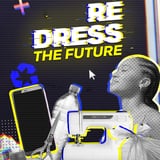
Image Source: Waterbear
Mikaela Loach is a climate justice activist, medical student, and claimant for Paid to Pollute – a non-profit organisation that is taking the UK government to court for paying billions in tax breaks to the oil and gas industry. The polyester used to make cheap clothes by fast fashion brands is a byproduct of drilling for oil and gas, which is also fuelling rising temperatures around the world. In Loach’s new documentary ReDress the Future, they partner with streaming platform Waterbear to investigate our attachment to unsustainable fashion, and explore how we can create healthy new ways to be creative with our clothes.
ReDress the Future introduces the ideas and innovators who are questioning and reinventing a broken fashion system. Including expert insight from Fashion Revolution’s creative director Orsola De Castro, Raeburn Design’s creative director Christopher Raeburn, fashion designer Phoebe English, and We Are Kin designer Ngoni Chikwenengere, ReDress the Future interrogates consumerism, waste, and fast fashion in a three-part series. In each episode, “ReDressing New”, “ReDressing Waste”, and “ReDressing the Model”, we are inspired to have a relationship with fashion that is better aligned with climate justice. At the premiere of ReDress the Future, Loach explained how the climate crisis is the great multiplier of other systemic issues, and ways in which we can be a part of a new world of ideas that is emerging.
Loach didn’t realise the enormity of the climate crisis until it became clear to her how climate justice affects other issues like systemic racism and the safety of migrants. “If we want to tackle these issues, we also have to tackle the climate crisis,” she told POPSUGAR. “I realised that when we tackle all these things through a climate justice lens, we have a great opportunity to actually create a better world by confronting the root cause of the problem rather than just the symptoms.” Loach suggests that how we use and abuse the planet for profit sets a precedent for how we treat our fellow humans. If we want to create positive change, we must try to understand how intersectionality shapes systemic exploitation.
“There is no such thing as a single-issue struggle because we do not live single-issue lives,” Loach quoted American writer Audre Lorde.
“There is no such thing as a single-issue struggle because we do not live single-issue lives,” Loach quoted American writer Audre Lorde to define intersectionality. “The reality is that all of the issues that exist in the world are connected. Everything that we do is connected to the systems of exploitation, is connected to white supremacy, is connected to climate degradation. Especially when we talk about fashion, it’s an industry where you can clearly see how connected climate justice is to racial justice and gender liberation. When we look at who is making these clothes, a majority of garment workers are women of colour, and they are the ones being exploited, and experiencing the most harm. Why is that allowed? And why is the climate crisis most harmful in certain areas of the world? It’s because of a legacy of the colonial mindset that currently exists.”
It’s easy to get discouraged about the 700,000 tonnes of clothes that Brits send to landfill every year in the name of ‘not wearing the same outfit twice’, but Loach believes that positive change is happening. The fact that major high street brands are “greenwashing” their clothes means that big business is responding to the demands of sustainability. “If a brand brings out a sustainable line, but that’s only 2% of their entire product range. You can say, if this is a sustainable and ethical line, what’s the rest of your clothes? It just shows that they’re running scared and that we are having an impact in some way.” In the same breath, Loach reminds us that we always need to be skeptical of powerful fashion brands because as much as they say they care about people or planet, they are legally obligated to create profits for investors.
Image Source: Waterbear
Can the fashion industry ever truly be sustainable if its very existence is based on profits and trends? The short answer is no. “That’s why I think I sit more on the abolitionist side of things, because I’m not sure if we can reform a system that has been created to be this harmful,” Loach said. In ReDress the Future, Loach reveals how the fashion industry was built to be exploitative and opaque. She presents the idea that our current consumption of clothing and trends is shaped by a neocolonial mindset that thinks “I need to look great to be empowered, even if it’s at the expense of other people.”
“We need to really dissect that idea and move away from that,” Loach said. “The industry, as it is now, is very much about making new things out of new things. Then I see what Christopher Raeburn is doing, and what people in the documentary are doing outside of that fashion model. What we need to be doing is creating things that are outside of that fashion model. Throw away the rule book with what we’ve learned, and do things completely differently. Then think, how can we create something that actually benefits all of us? That’s something that I don’t think the fashion industry was ever created to think, and that’s why we should look outside of that system.”
Image Source: Waterbear
Hosting ReDress the Future gave Loach a lot of hope for positive change within the fashion industry, but she still believes that our best next step towards a sustainable future is by creating something completely new. “I don’t think that the industry could actually be sustainable within our lifetime,” she admits. “Instead, I think we can invest our time into making something new, rather than fighting fires within something that is inherently built to be harmful. Just because the system exists currently, doesn’t mean that we have to say that it’s okay for it to exist or that it should continue to exist. What we should do instead is reflect on why it exists? And why we can’t just create something else?”
Watch ReDress the Future hosted by Mikaela Loach on Waterbear.


